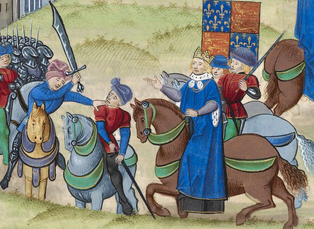- Home
- About Us
- News & Events
- The Parishes
- The Heritage Centre
- Maps & Transport
- Educational Resources
- Social Media Channels
- Listed Buildings & Structures
- Research Documents
- Archive Downloads & Podcasts
- Member Publications
- Fundraising
- Sponsors & Alliances
- Contact Us
- Find Us
- Shop
- Blue Plaque Installations
- Blog
Junior Basildon Heritage (trial section)

The Peasants Revolt 1381
Wat Tyler
The Peasants' Revolt of 1381 was a big event in England, where many poor workers, called peasants, decided they had had enough of being treated unfairly. Life for peasants was very tough in the 14th century. Most peasants worked on farms owned by wealthy lords. They paid taxes and worked long hours, but they didn’t earn much money. They also had to follow many rules set by the king and lords.
The rebellion started because the peasants were angry about high taxes. At the time, the king, Richard II, was trying to raise money for wars. He introduced a tax called the "Poll Tax" that everyone had to pay, no matter how poor they were. This upset many people, especially since they already had little money to live on.
One of the leaders of the revolt was a man named Wat Tyler. He was a peasant who became very angry about the way his fellow peasants were being treated. Wat Tyler gathered a group of rebels to march to London. The peasants believed that if they could reach the king and tell him their problems, things might get better.
In the summer of 1381, thousands of peasants, led by Wat Tyler, marched into London. They broke into the homes of rich people, destroyed records of taxes, and even took over the Tower of London. The rebels wanted the king to listen to their demands, which included lower taxes and better rights for workers.
King Richard II, who was only a child at the time, agreed to meet with Wat Tyler. The two met at Smithfield, a field in London. But things took a turn when Wat Tyler was killed by the king’s guards during the meeting. After Wat Tyler’s death, the rebellion lost its leader, and the peasants were forced to go home.
Although the revolt ended, it didn’t solve the problems of the peasants. However, it did show that people were willing to stand up for their rights, and it made the king think about how to treat his people more fairly. Over time, the king made some changes to help improve the lives of the poor, although it took many years for real change to happen.
The Peasants’ Revolt is an important event in history because it showed how ordinary people can fight for what they believe is right.